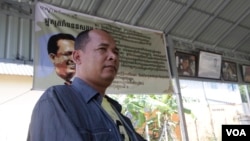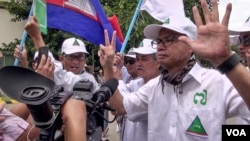A large portrait of Kem Ley, the slain political commentator and organizer, still hangs in front of his home here in Takeo province. The image is fading and worn, but down the road, a shiny new logo of the One Khmer Party, founded by Ley’s brother, is a reminder of Ley’s legacy.
One Khmer is one of more than a dozen minor opposition parties contesting the July 29 election in the absence of the country’s main opposition party, the Cambodia National Rescue Party, which was dissolved in November over claims its leaders conspired with foreign powers in a plot to overthrow Prime Minister Hun Sen.
Kem Rithisith, Ley’s younger brother, is one of a small number of emerging political figures who are hoping to capitalize on the CNRP’s absence from the ballot. Ley was an outspoken critic of both the ruling Cambodian People’s Party and on occasion the opposition.
At a Buddhist ceremony to mark the two-year anniversary of Ley’s untimely death, in Tram Kak district’s Leay Bor commune, Rithisith said he hoped that the end of the CNRP could make a new beginning for Cambodian politics, with a more pluralist democracy in the offing.
“It should be more than one or two parties for people to take part and making more voices in parliament to debate new laws,” he said. “If there is only one party, everything will be decided by one side without opposition or criticism.”
Sitting behind an unfinished stupa dedicated to Ley, Rithisith said the pursuit of justice for his brother and other slain dissidents would continue and One Khmer would lobby for action to be taken. “The idea and goal of the name of the party are that we are not subject to any party and we are independent,” he said. “There are many unjust acts happening to many people,” he added, going on to name several unsolved high-profile murders of activists and other public figures.
Authorities arrested and charged one man, Oeut Ang, a former soldier, and monk, with Ley’s murder, which the veteran claimed was over a $3,000 debt. But evidence uncovered by journalists pointed to military involvement in the killing. Leads in the case pointed to a wider conspiracy were not followed by the judiciary. Ang received a life sentence.
A New Grassroots
Ley’s influence on Cambodian politics extends to another party, the Grassroots Democratic Party (GDP), which he helped found. Yang Saing Koma, the party’s director, and presidential candidate said Ley’s political philosophy was deeply embedded in the party.
“There are 10 points that we have written in [our manifesto], meaning keeping things simple, localism, and liberalism,” he said. “He was a simple man and localist, so we do everything in a simple way.”
Ley founded Khmer for Khmer, a social network which later evolved into the GDP. But his widow, Bou Rachana, who now lives as a refugee in Australia with their children, said Ley had never shown an interest in political power himself.
Rithisith, however, remembers things differently. He says his brother often talked of the need to form a political party.
“I took the idea from Dr. Kem Ley. He said we shouldn’t have one or two parties, we can create more than that. Now we have 20 parties, but we could have 100 or 200 parties. There is no problem. The important thing is that we come up with clear policies to gain people’s trust, so we will get more support,” he said.
Rithisith believes his party will win seats in the election later this month having prioritized the needs of ordinary Cambodians and their living standards. He added that One Khmer would introduce the death penalty for drug traffickers and dealers and work to increase food safety.
Sam Inn, the GDP’s secretary general, said in a video posted to Facebook that the party platform rested on two main pillars: improving public services and good governance to bolster economic growth. “It’s our aim to promote economic growth but economic growth with equality. We will do anything to provide good public services efficiently and free of charge, with no corruption,” he said.
Some fear that the memory of Ley will fade and divisions in the political movement he began will overshadow his message.
Khim Sokhon, a motor-taxi driver who attended the two-year anniversary, said compared with previous years the event was subdued.
“The most important thing that I can see obviously is the internal divisions of Khmer for Khmer,” he said.










